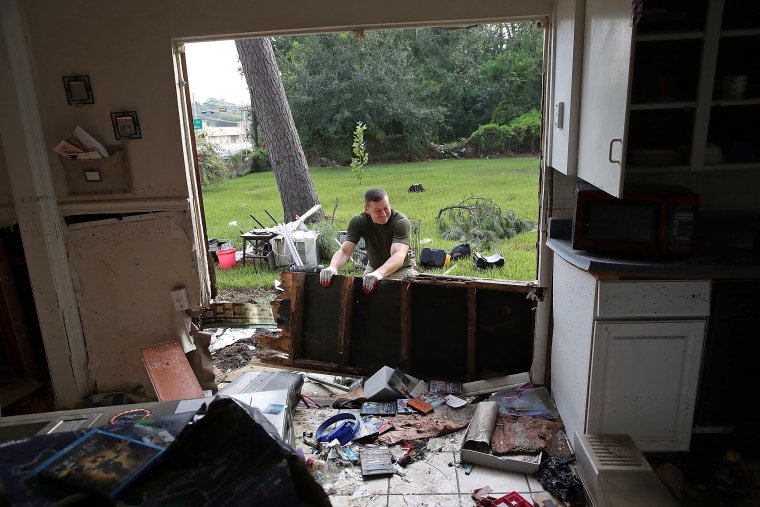WASHINGTON — The White House and Congress are hoping to swiftly approve billions of dollars in aid for the victims of Hurricane Harvey as Texas begins to dry out from the unprecedented rainfall that has crippled the Gulf Coast.
The Trump administration is expected to make an initial funding request to Congress of at least $5.5 billion for Harvey, two Republican congressional sources told NBC News. The request is likely to be split between $5 billion for the Federal Emergency Management Agency Disaster Relief Fund and $500 million for a small-business loan fund.
Administration officials familiar with the request told NBC News additional money could be added and the formal funding request could be made as soon as Friday.
Congress returns from its five-week August recess on Tuesday having spent most of 2017 embroiled in contentious battles over health care, immigration, and spending that have resulted in little in terms of legislative accomplishments. But congressional leaders now hope the spirit of unity to help victims will give a temporary respite from the gridlock in Washington.
A quick response to the storm that garners an overwhelming majority vote would represent a marked shift in what was shaping up to be fall legislative agenda filled with more party-line votes and political fights. Last week, Trump suggested he would advocate for a government shutdown if Congress does not pass funding for his proposed wall along the country’s southern border. Now talk of letting the government partially shutter when funding ends on Sept. 30 has gone quiet.
Passing an aid bill that also includes lifting the debt ceiling until after the 2018 midterm election, as some lawmakers have suggested, would save members a brutal high-stakes battle over a potential national default.
But that might take too long for hurricane victims. Sources say FEMA is burning through the cash it has so fast that the agency might not be able to wait until late September for more help.
The Senate Appropriations Committee acted Thursday to redirect $500 million in existing FEMA funds to go towards the disaster relief effort, a GOP aide said. The committee, which is responsible for allocating federal funds, is preparing to quickly process the emergency request for additional Harvey aid.
The initial $5.5 billion will represent just a fraction of the funding that will be needed. The government approved more than $50 billion after Superstorm Sandy ravaged the East Coast in 2012, and Texas Gov. Greg Abbott said Wednesday that the his state will need more than $125 billion from Washington.
It has put many members of the Texas delegation in the awkward position of advocating for funding after having voted against Sandy relief packages.
"The problem with that particular bill is it became a $50 billion bill that was filled with unrelated pork,” Texas Sen. Ted Cruz told MSNBC this week. But fact checkers have largely debunked the claims being made by Cruz and other Texas Republicans who voted against Sandy funding.
“We’ll be working on a supplemental appropriation bill to benefit the victims of Hurricane Harvey,” said Texas Sen. John Cornyn, who also voted against Sandy money, in a statement. “Most of this is done according to federal formulas that already exist. This is not just money that’s doled out for any purpose. This has to be targeted for disaster relief and recovery from Hurricane Harvey.”
And no matter what the final relief funding looks like, it alone can’t rebuild Houston and the gulf areas devastated by Harvey, former deputy administrator of FEMA Richard Serino said on MSNBC.
“This is not one event that one person can do, not one agency can do it, what one department can do. This is going to truly take the entire whole of the community to come together," Serino said.


